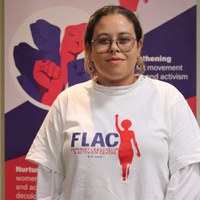
30 Years of Democracy, Where Is the Change?

As young people, the spaces and positionalities we take up in politics are often overlooked and missing from “high-level” conversations because our leaders are too busy dismantling our country for their needs. This, however, is of no indication that we are not interested in politics or the shaping of the political climate in our country. We live in a world shaped by continual trauma and systemic failures, and the voices of young people are rising to challenge injustices with unprecedented passion.
Emerging from diverse backgrounds, we are finding our political voice through alternative means such as social media platforms, protests, and rallies that create change and momentum, where standing at a voting station has not. In South Africa, a nation with a rich history of resistance, the legacy of youth activism persists, fueled by ongoing struggles against the lingering effects of white supremacy and maintained by change-makers on the ground without a political badge. We simply want to live our African dream where strife and suffering are not a commonality that draws us together.
As we commemorate Freedom Day, marking the first democratic elections in 1994, we witness a contradiction of what seems like progress for some and persistent challenges for most. The comparison between the promises of democracy then and the realities faced by young people today underscores the ongoing struggle for true freedom and equality. While the advent of democracy brought hope and liberation, it also revealed the entrenched inequalities and injustices that continue to plague our society. The aspirations of the youth for a more just and equitable world resonate deeply with the ideals of Freedom Day, yet the gap between ideals and reality remains stark.
In the years following the dawn of our democracy, numerous student-led protests took place across the country. Both tertiary and high school students collectively banded together to protest the inequalities within the education system, as well as the rising rates of gender-based violence and sexual violence in the country. Protests like #FeesMustFall and #AmINext were done to draw attention to the intersectional challenges faced by young South Africans.
These movements rallied the nation through social media which has become a platform for youth to share collective notions of struggle and oppression in a matter of minutes. Our ability to unify on a scale like this has never been done before. It creates a collective sense of empowerment and voice. It also alludes to the intersectionality of aspects of injustice and oppression that may have been hidden and lost in the mainstream.
Politics is a complex field to navigate, and those who were often thought to be lacking in understanding or too young to grasp its complexities are changing the political landscape. We can no longer sit back and watch the world burn simply because it's not always our problem; it's not even our fault. But it’s the world we live in, and it's our job to make it the world we want to live in. We never asked for the ‘sins of fathers’ or to wake up to find that Gaza is dying, and yet global leaders expect us to do nothing? We will no longer be remembered as the generation who complains too much because we are the generation who took to the streets moved by the war cries of our fallen.
As a young feminist, I believe that all the above mentioned and much more that the reader can think of are reason enough for us to do something. Whether you’re taking to the polls on election day, staging a sit-in to support unemployed doctors, signing a petition from the comfort of your home, or challenging social norms in your community, do better because you deserve better.
Aneeqa Abrahams is the Soul City Institute’s Feminist and Leadership Activism Centre (FLAC) fellow and an emerging intersectional feminist researcher and published author.
